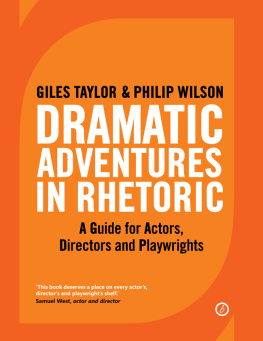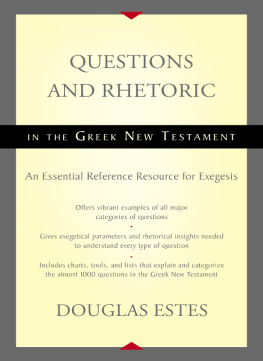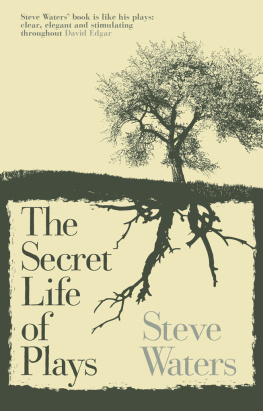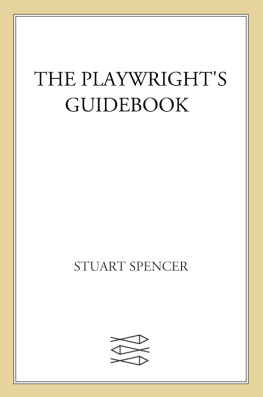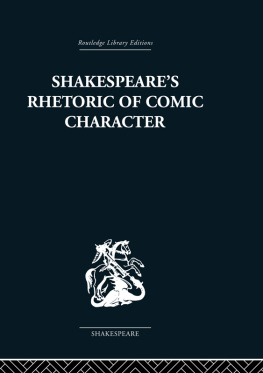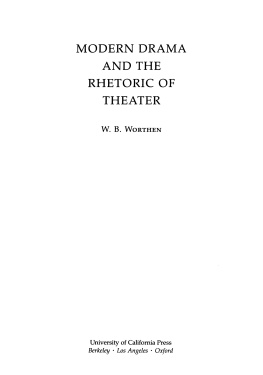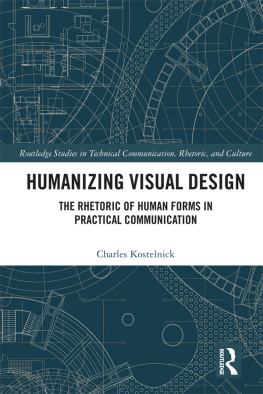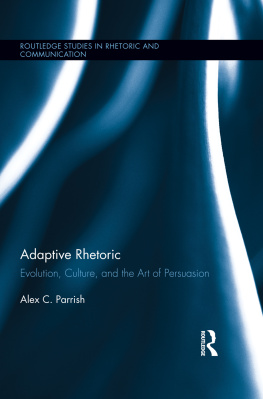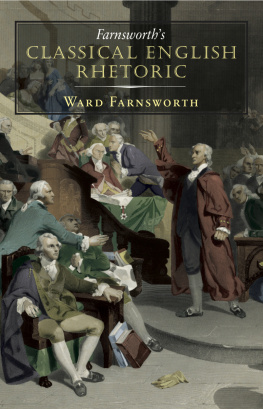This wonderful book a history, guide and manual in one is well-titled. It promises us adventures, and delivers them. Well-armed actors should make rhetoric part of their arsenal. Dramatic Adventures in Rhetoric will train your eyes, your mouth, and (perhaps most usefully for actors) your ears. I like this book extremely. Ill use it. Fun but never foolish, precise but never pedantic, exhaustive but never exhausting, it deserves a place on every actors, directors and playwrights shelf.
Samuel West, actor and director
A hugely enjoyable and, most importantly, a brilliantly user-friendly resource for writers, actors, directors, and teachers politicians and protestors too. Rhetoric was always something I felt intuitively without properly understanding it. To be made more conscious of its rules and principles can only help me as a writer. A remarkably informative and entertaining companion.
James Graham, playwright
This is an incredibly revealing and insightful book, through which the authors guide us with generosity and wit. Surprisingly entertaining, it is packed full of funny and moving examples of the best dramatic writing, both classical and contemporary. Naming and explaining the devices that playwrights use (consciously or otherwise) can further our understanding of dramatic writing, and our confidence when working with it. I can imagine having it on my desk in rehearsal for problem-solving, or dipping into it lazily for amusement and inspiration.
Jeremy Herrin, director
We dont always know why we say what we say, or write what we write but invariably, the Greeks have a word for it. Packed with memorable and quotable examples from sources ancient and modern, this witty and well-organised handbook offers a lexicon for our efforts, terms for our art. For any teacher, actor or writer, a useful and fascinating guide.
Hilary Mantel, writer
An exciting, useful and thoroughly entertaining book, which opens up whole new directions for text rehearsals. I am so looking forward to tackling a new script I have never felt so prepared. Dont go into rehearsals without it!
Nathaniel Parker, actor
GILES TAYLOR & PHILIP WILSON
DRAMATIC
ADVENTURES
IN RHETORIC
A Guide for Actors,
Directors and Playwrights

OBERON BOOKS
LONDON
WWW.OBERONBOOKS.COM
First published in 2015 by Oberon Books Ltd
521 Caledonian Road, London N7 9RH
Tel: +44 (0) 20 7607 3637 / Fax: +44 (0) 20 7607 3629
e-mail:
www.oberonbooks.com
Copyright Giles Taylor and Philip Wilson, 2015
Giles Taylor and Philip Wilson are hereby identified as authors of this work in accordance with section 77 of the Copyright, Designs and Patents Act 1988. The authors have asserted their moral rights.
You may not copy, store, distribute, transmit, reproduce or otherwise make available this publication (or any part of it) in any form, or binding or by any means (print, electronic, digital, optical, mechanical, photocopying, recording or otherwise), without the prior written permission of the publisher. Any person who does any unauthorized act in relation to this publication may be liable to criminal prosecution and civil claims for damages.
A catalogue record for this book is available from the British Library.
PB ISBN: 9781849434911
EPUB ISBN: 9781783198177
Cover design by James Illman
Text layout by Konstantinos Vasdekis
Printed, bound and converted
by CPI Group (UK) Ltd, Croydon, CR0 4YY.
Visit www.oberonbooks.com to read more about all our books and to buy them. You will also find features, author interviews and news of any author events, and you can sign up for e-newsletters so that youre always first to hear about our new releases.
Thanks
We would like to thank:
James Hogan, Charles Glanville, George Spender, Melina Theocharidou, Andrew Walby, Lewis Morgan, James Illman, Konstantinos Vasdekis, Tia Begum, Emma Hall, Matthew Urwin and Ain Ryan at Oberon Books.
James Graham, Jeremy Herrin, Hilary Mantel, Nathaniel Parker and Samuel West, for their kind words of endorsement.
Dr Catherine Henstridge at OED, for clarifying numerous definitions; Francis Matthews, for various title suggestions; Xavier Mascarell, for his support and encouragement; students at GSA and MTA, and directors on the Genesis Programme, for allowing Giles to practice what he preaches; Oscar Pearce, John Ramm, Matthew Pidgeon and Nicholas Boulton in the RSC Wolf Hall dressing room, for their suggestions; Simon Robinson, for drawing our attention to the device Reductio ad Hitlerum. And last but very much not least, the cast of the double-bill of The Importance of Being Earnest and Travesties at Birmingham Rep that inspired this book Emily Bowker, Nick Caldecott, Tom Davey, Matthew Douglas, Abigail McKern, Emerald OHanrahan and Roger Ringrose, along with Associate Director Louise Hill.
Emma Anacootee-Parmar at Samuel French Ltd; Marigold Atkey at David Higham Associates; Tom Atkins at The Random House Group Penguin Random House UK; Sarah Baxter at The Society of Authors; Valerie Borchardt and Samantha Shea at Georges Borchardt, Inc; Kate Brower and Victoria Williams at Alan Brodie Representation Ltd; Michael Callahan at Josef Weinberger Ltd; Emma Cheshire at Faber & Faber Ltd; Rose Cobbe, Sean Gascoine, Christian Ogunbanjo, Giles Smart, Nicki Stoddart, Ilaria Tarasconi and Charles Walker at United Agents; Gordon Dickerson; Janet Glass at Eric Glass Ltd; Katie Haines, Julia Kreitman and Leah Schmidt at The Agency; Ben Hall and Lily Williams at Curtis Brown Group Ltd; Nick Hern at Nick Hern Books Ltd; Georgia Ingles at Wylie Agency; Mel Kenyon and Ginny Sennett at Casarotto Ramsay & Associates Ltd; Joyce Ketay at The Gersh Agency; George Lane and Elizabeth Grobel at Creative Artists Agency; Christine Lee at Simon & Schuster; Rupert Lord and Helen Mumby at Macnaughton Lord Representation; Jennie Miller at Independent Talent Group Ltd; Keelan Pacot at Grove/Atlantic, Inc; Imogen Sarre at Knight Hall Agency Ltd; Judith Scott at Amber Lane Press; Christopher Wait at New Directions Publishing; Claire Weatherhead at Bloomsbury Publishing Plc, and Jared Weber at ICM Partners for their generous assistance in securing and granting permission for quotations.
Contents
Introduction
HENRY: Words Theyre innocent, neutral, precise, standing for this, describing that, meaning the other, so if you look after them you can build bridges across incomprehension and chaos.
Tom Stoppard, The Real Thing (1982)
How This Book Came About
Back in 2011, the two of us were working on a double-bill of Oscar Wildes The Importance of Being Earnest and Tom Stoppards Travesties at Birmingham Rep. Initial round-the-table discussions included mention of how both plays drew heavily on rhetorical devices. One speech of Stoppards play was only truly unlocked once we spotted that it involved an extended PAROMOIOSIS.
The cast were fascinated by how many rhetorical devices were present in each play, but understandably and not unusually were unaware of their names and their effects. We compiled a comprehensive list, and a tea-break conversation led to the idea that we might be able to help other theatre practitioners to deepen their appreciation of the form and content of the plays they are working on, and in doing so to enrich their understanding of how best to communicate them.
What is Rhetoric?
The Oxford English Dictionary defines rhetoric in two ways: as the art of effective or persuasive speaking or writing, and as language designed to persuade or impress. Aristotles famous definition claims rhetoric to be the art of seeing the available means of persuasion. Our core aim in this book is that, by identifying the
Next page
